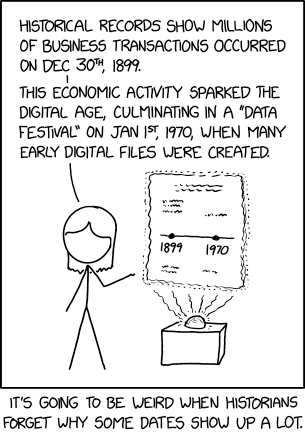gemini calls the request-response cycle a transaction in the spec. since trasactions are not cached, we have this problem where we can’t tell if anything was updated without fetching it and we can’t indicate how often a client should expect the content to be valid. the most common solution right now to just to keep requesting the resource until it changes or stops existing, which isn’t ideal. this sort of update notification model is interesting because it re-frames your thinking into something more like event sourcing. you end up needing to add an event queue and dispatch to the server, which is a bit more complex on the server side than plain static files, but the client stays the same. i’m curious to see what kind of systems could be built on this gemini message queue concept.
that’s a neat solution to the dead old feeds problem. pull-once-once-on-notify seems to fit the gemini tx model better than scraping pages on a cron timer. i don’t have a mechanism in my setup to produce that event yet other than the cron that rebuilds the capsule periodically, but that’s just a stand-in for not having any CI rn and especially not a CI that works with fossil.
👋 Reminder folks of the upcoming Yarn.social monthly online meetup:
I hope to see @david@collantes.us @movq@www.uninformativ.de @lyse@lyse.isobeef.org @xuu@txt.sour.is @sorenpeter@darch.dk and hopefully others too @aelaraji@aelaraji.com @falsifian@www.falsifian.org and anyone else that sees this! 🙏 We’re hopefully going to primarily discuss the future of Twtxt and the last few weeks of discussions 🤣
- Event: Yarn.social Online Meetup
- When: 28th September 2024 at 12:00pm UTC (midday)
- Where: Mills Meet : Yarn.social
- Cadence: 4th Saturday of every Month
Agenda:
- Let’s talk about the upcoming changes to the Twtxt spec(s)
- See #xgghhnq
- See #xgghhnq
the new post-quantum encryption algos have dope names CRYSTALS-Kyber, CRYSTALS-Dilithium, SPHINCS+, FALCON https://www.nist.gov/news-events/news/2023/08/nist-standardize-encryption-algorithms-can-resist-attack-quantum-computers
Celestial Event
 ⌘ Read more
⌘ Read more
@movq@www.uninformativ.de This outage did affect me, though not much, via the university where my wife teaches and where I teach sometimes. They actually sent out an alert in their emergency alert system (the one they use to alert people of extreme weather events and bomb threats, mostly), telling people that all IT systems were down.
A friend of mine elsewhere pointed out that they pushed this change on a Friday, which of course no software developer with any experience would ever, ever, ever do. I have to assume there’s some toxic management at CrowdStrike, but who knows. Even more reasons to sympathize with the poor folks who are probably going to be working nights and weekends to clean up this mess.
Chasing
 ⌘ Read more
⌘ Read more
👋 Okay folks, let’s startup the Yarn.social calls again.
- Event: Yarn.social Online Meetup
- When: 25th May 2024 at 12:00pm UTC (midday)
- Where: Mills Meet : Yarn.social
- Cadence: 4th Saturday of every Month
Agenda:
Anything we want to talk about. Twtxt, Yarn, self hosting, cool stuff you’ve been working on. chit-chat, whatever 😅
@lyse@lyse.isobeef.org They sure are silly at times. :-) You really have to combine this event with something else, like learning a new language. Otherwise it gets boring real quick.
What I absolutely love about AoC is that it’s – indeed – a bit like school. 😅 The problems are well-defined, the inputs are well-defined, and there is a definite answer. It’s either right or wrong – period. Compared to real life and work, I welcome this very much. 🤣
@xuu@txt.sour.is Ah, you went with the “scanning” approach as well. I did that, too.
It’s quite surprising to see (imho) how many people on reddit started substituting strings (one becomes 1 etc.). That makes the puzzle much harder by introducing nasty corner cases.
(Maybe I was just lucky this time to pick the correct approach right from the start. 🤣 Or maybe it’s a bit of experience from doing past AoC events …)
Talking in the local dev group about twtxt. Let’s see if new hackers join the conversation.

Dendrochronology
 ⌘ Read more
⌘ Read more

Let’s be clear here. Daniel Penny allegedly choked a black man, Jordan Neely, to death on a subway car. Neely was being loud, but he was not physically threatening anybody and did not have a weapon. In any other context, this would be called “murder”, at the very least, “manslaughter” if one were being gracious. Because of the US’s history, a white man murdering a black man in sight of the public is oftentimes, and rightfully, called a “lynching”. It has a public, political purpose amounting to terrorism.
Daniel Penny was allowed to go free for awhile after this event. He is only now facing accountability, having been recently indicted (arrested and charged with a crime) as he should have been day of. And here is racist right-wing toadie Ben Shapiro saying that Daniel Penny–the white alleged killer–is the one being lynched. Not the black man who was allegedly murdered by Penny in view of the public, and who is now dead. Penny himself, who is still very much alive.
@prologic@twtxt.net, I don’t know how you go on defending Ben Shapiro, but in the context of US society, what Shapiro is saying is reprehensible and unacceptable. He’s a right-wing troll with disgusting, not to mention flat out stupid, opinions.
@abucci@anthony.buc.ci buuuuut it show when winter!
In the time scale viewed from the planets perspective, the climate has changed many many times.. The issue is whether that change that will inevitability come is hospitable to us meat bags. Or if we are doomed to take part in the next mass extinction event.
I was listening to an O’Reilly hosted event where they had the CEO of GitHub, Thomas Dohmke, talking about CoPilot. I asked about biased systems and copyright problems. He, Thomas Dohmke, said, that in the next iteration they will show name, repo and licence information next to the code snippets you see in CoPilot. This should give a bit more transparency. The developer still has to decide to adhere to the licence. On the other hand, I have to say he is right about the fact, that probably every one of us has used a code snippet from stack overflow (where 99% no licence or copyright is mentioned) or GitHub repos or some tutorial website without mentioning where the code came from. Of course, CoPilot has trained with a lot of code from public repos. It is a more or less a much faster and better search engine that the existing tools have been because how much code has been used from public GitHub repos without adding the source to code you pasted it into?

From my small experience in writing an event database, I am inclined to agree with this.
Historical Dates
 ⌘ Read more
⌘ Read more
(cont.)
Just to give some context on some of the components around the code structure.. I wrote this up around an earlier version of aggregate code. This generic bit simplifies things by removing the need of the Crud functions for each aggregate.
Domain ObjectsA domain object can be used as an aggregate by adding the event.AggregateRoot struct and finish implementing event.Aggregate. The AggregateRoot implements logic for adding events after they are either Raised by a command or Appended by the eventstore Load or service ApplyFn methods. It also tracks the uncommitted events that are saved using the eventstore Save method.
type User struct {
Identity string ```json:"identity"`
CreatedAt time.Time
event.AggregateRoot
}
// StreamID for the aggregate when stored or loaded from ES.
func (a *User) StreamID() string {
return "user-" + a.Identity
}
// ApplyEvent to the aggregate state.
func (a *User) ApplyEvent(lis ...event.Event) {
for _, e := range lis {
switch e := e.(type) {
case *UserCreated:
a.Identity = e.Identity
a.CreatedAt = e.EventMeta().CreatedDate
/* ... */
}
}
}
Events are applied to the aggregate. They are defined by adding the event.Meta and implementing the getter/setters for event.Event
type UserCreated struct {
eventMeta event.Meta
Identity string
}
func (c *UserCreated) EventMeta() (m event.Meta) {
if c != nil {
m = c.eventMeta
}
return m
}
func (c *UserCreated) SetEventMeta(m event.Meta) {
if c != nil {
c.eventMeta = m
}
}
With a domain object that implements the event.Aggregate the event store client can load events and apply them using the Load(ctx, agg) method.
// GetUser populates an user from event store.
func (rw *User) GetUser(ctx context.Context, userID string) (*domain.User, error) {
user := &domain.User{Identity: userID}
err := rw.es.Load(ctx, user)
if err != nil {
if err != nil {
if errors.Is(err, eventstore.ErrStreamNotFound) {
return user, ErrNotFound
}
return user, err
}
return nil, err
}
return user, err
}
An OnX command will validate the state of the domain object can have the command performed on it. If it can be applied it raises the event using event.Raise() Otherwise it returns an error.
// OnCreate raises an UserCreated event to create the user.
// Note: The handler will check that the user does not already exsist.
func (a *User) OnCreate(identity string) error {
event.Raise(a, &UserCreated{Identity: identity})
return nil
}
// OnScored will attempt to score a task.
// If the task is not in a Created state it will fail.
func (a *Task) OnScored(taskID string, score int64, attributes Attributes) error {
if a.State != TaskStateCreated {
return fmt.Errorf("task expected created, got %s", a.State)
}
event.Raise(a, &TaskScored{TaskID: taskID, Attributes: attributes, Score: score})
return nil
}
The following functions in the aggregate service can be used to perform creation and updating of aggregates. The Update function will ensure the aggregate exists, where the Create is intended for non-existent aggregates. These can probably be combined into one function.
// Create is used when the stream does not yet exist.
func (rw *User) Create(
ctx context.Context,
identity string,
fn func(*domain.User) error,
) (*domain.User, error) {
session, err := rw.GetUser(ctx, identity)
if err != nil && !errors.Is(err, ErrNotFound) {
return nil, err
}
if err = fn(session); err != nil {
return nil, err
}
_, err = rw.es.Save(ctx, session)
return session, err
}
// Update is used when the stream already exists.
func (rw *User) Update(
ctx context.Context,
identity string,
fn func(*domain.User) error,
) (*domain.User, error) {
session, err := rw.GetUser(ctx, identity)
if err != nil {
return nil, err
}
if err = fn(session); err != nil {
return nil, err
}
_, err = rw.es.Save(ctx, session)
return session, err
}
Progress! so i have moved into working on aggregates. Which are a grouping of events that replayed on an object set the current state of the object. I came up with this little bit of generic wonder.
type PA[T any] interface {
event.Aggregate
*T
}
// Create uses fn to create a new aggregate and store in db.
func Create[A any, T PA[A]](ctx context.Context, es *EventStore, streamID string, fn func(context.Context, T) error) (agg T, err error) {
ctx, span := logz.Span(ctx)
defer span.End()
agg = new(A)
agg.SetStreamID(streamID)
if err = es.Load(ctx, agg); err != nil {
return
}
if err = event.NotExists(agg); err != nil {
return
}
if err = fn(ctx, agg); err != nil {
return
}
var i uint64
if i, err = es.Save(ctx, agg); err != nil {
return
}
span.AddEvent(fmt.Sprint("wrote events = ", i))
return
}
This lets me do something like this:
a, err := es.Create(ctx, r.es, streamID, func(ctx context.Context, agg *domain.SaltyUser) error {
return agg.OnUserRegister(nick, key)
})
I can tell the function the type being modified and returned using the function argument that is passed in. pretty cray cray.
Hi, I am playing with making an event sourcing database. Its super alpha but I thought I would share since others are talking about databases and such.
It’s super basic. Using tidwall/wal as the disk backing. The first use case I am playing with is an implementation of msgbus. I can post events to it and read them back in reverse order.

I plan to expand it to handle other event sourcing type things like aggregates and projections.
Find it here: sour-is/ev
@prologic@twtxt.net @movq@www.uninformativ.de @lyse@lyse.isobeef.org
Health Data
 ⌘ Read more
⌘ Read more
#event Upcomming Meetup in Copennhagen: algolab(the_art_of_live_coding) @ Støberiet / Computer Klub 
Apple Event for 18 October 2021, 10:00 PDT, 13:00 EDT begins. Commentary will stream as replies to this twt. I might miss things here and there, as I will also be on a work meeting from 13:00 to 14:00 EDT.
Apple Store online down before today’s event. Less than two hours till it goes live!
@prologic@twtxt.net I am thinking on calling in sick to work. 😂 Every time I order an iPhone, I take the day off on delivery day. On Apple events I normally use my lunch and break times all combined, to watch them.
Apple’s event on Monday is bringing, as always, speculation to the table. One thing most outlets seem to agree is the introduction of an “M1X” chip, thought Apple might call it differently. M1X might also mean, M1(we don’t know what comes after, or next generation). Either way, I would really like to see the return of the 27” iMac, but I will not hold my breath. Nevertheless, Monday is going to be an exciting day for many, including me! 🍎
@prologic@twtxt.net Works permit, I will probably be twting about it. I try not to miss one single event.
“Join us for a special event.” Unleashed 😯
#event Tomorrow, Saturday October 2nd, I’m gonna be hosting a workshop at Processing Community Day CPH about Live Coding Visuals in Improviz. Only 5 spots left, so sign up now at: https://pcdcph.com 
#event Upcoming Workshop / algolab: Music and Live Coding @ CPH Music Maker Space / facebook event
#event Upcoming Workshop / algolab: Visuals and Live Coding @ CPH Music Maker Space / facebook event 
in some ways, tomo el fuego is an effort to break away from electron and javascript as the basis for application development. specifically p2p messaging, but there are a lot of general applications too. its true that i could have set this concern aside to focus on making the p2p things that i’ve been talking about over the last several years. i might have done something there, but i really don’t want to accept the status quo there. i want a much smaller foundation to build on than a web browser and an event library with V8 bolted on. dynamic 9-flavored p2p is coming, but there’s quite a bit more foundational work to do first.
fitness is a lifestyle, not an event
@lucidiot@tilde.town Agreeing that BuJo kind of saved my mind too. It now takes me about three months to fill up 251 pages with tasks, notes and events.